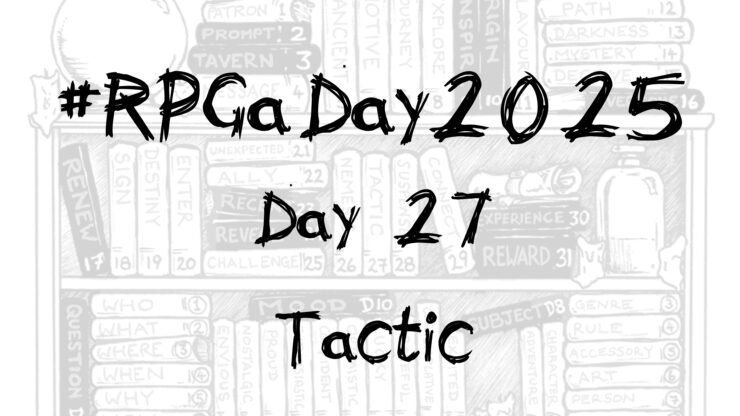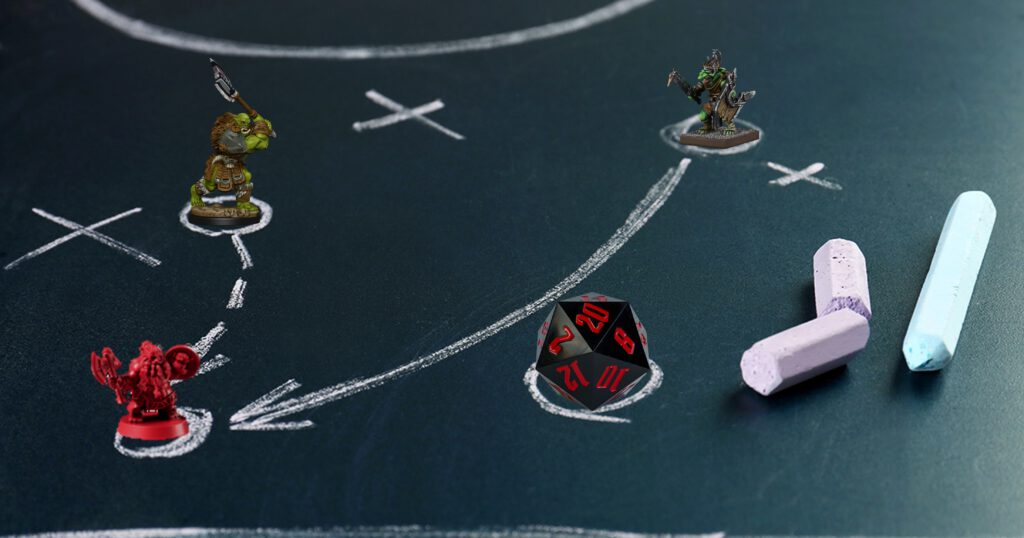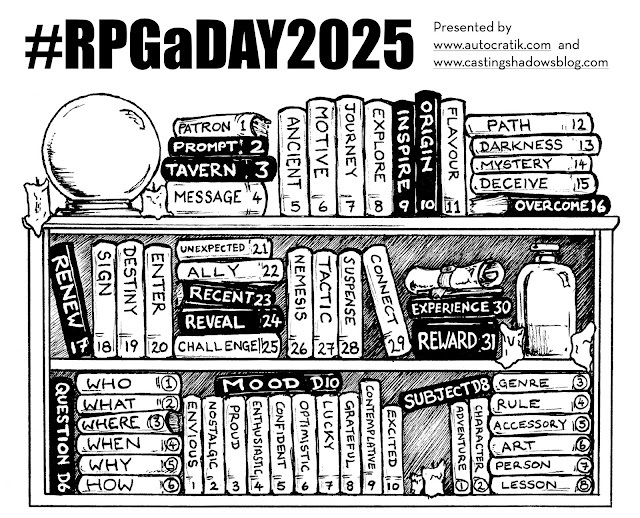Tactic, that’s the prompt for today on Day 27 of RPG a Day 2015. A tactic is, according to Merriam-Webster, “a device for accomplishing an end”, and Google, using Oxford’s results, says, “an action or strategy carefully planned to achieve a specific end”. I’ve been dispensing some general advice this month on keeping adventures going, encouraging player participation, and overcoming frustration. But let’s get down to the nitty-gritty: how do I do it? What are my tactics for this? Apologies if you’ve read some of these ideas in a previous post. I’ll reiterate some key points and discuss lessons learned over the past few years.
Sunglar’s Game Master Tactics
- Keeping a regular game going
Pick a day and frequency, stick to it, don’t cancel unless it’s an emergency. Really stick to it!
I’ve been fortunate to have kept a regular weekly game going since 1993. I started playing much earlier, in the summer of 1986, and we played almost every day back then. We were in high school, and we played whenever we could. Granted, when my grades slipped a bit, my mother put her foot down, and I could only play on weekends. We did, almost the whole weekend. During the summers, we played practically every day. Then we went to college, got jobs, and formed relationships. We kept playing whenever we could, but it was haphazard. I took stock of my gaming habits and decided to settle on one night a week, a regular day, and stick to it.
It has worked well since 1993, for 32 years. The day has moved around; players come and go. Natural disasters and pandemics have caused interruptions, and we’ve had to adapt to play remotely. My job, which has recently involved extensive travel, has presented new challenges, but we’ve managed to adapt to them. As the Game Master (GM), the onus is often on me to plan, coordinate, remind, and facilitate the game, but I do it.
I rarely cancel, primarily due to personal illness, family emergencies, or travel, but if I can play, I run the game. If players have any problems, and they inform me in advance, we may consider an alternative day that week. I run the game at the agreed-upon time, with the players who show up. I really believe that consistency and commitment are 75% of the success in my games. If players know you are showing up, they will too. Some may not, some may be there for a time, and then life happens, and they step away from the game. Other players will come. If you are consistent, they will come!
But how do you do this when you don’t want to run a game, when you feel frustrated?
- Dealing with GM burnout and frustration?
Grin and bear it!
That sounds harsh and a little boomer-like. It works for me, but it may not work for you. Allow me to be more nuanced.
Being a GM can be frustrating. It is all about being part referee, part improv artist, part social coordinator, part public speaker, part entertainer, part scribe, and part cat herder. A lot of hats, a lot of balls in the air, you may drop a few now and then. Particularly as a new GM, it is a lot to handle, and many who take on the responsibility of being a GM are often intelligent, perfectionists who overanalyze and can be overly self-critical. The same traits that make us good GMs also mean we can be terribly hard on ourselves, doubt our abilities, and overthink the game long after the session is over. I’ve been there.
How have I dealt with it? First of all, it gets better with time. Like most things in life, from riding a bike to public speaking to coding, the more you do it, the easier it becomes. One way to be a better GM and work through frustration is to do it.
But being a GM is so many things; we may not all be equally proficient at all of them. I may be better at improvisation and creating stories, but not so good at remembering the rules. Lean into your strengths, seek help for your deficiencies. Recruit the rules lawyer to help with combat or help other players with their characters.
Overwhelmed with things to do? Ask a player to handle initiative. Another may be the “hobbit-accountant” (fond memories of a former player, Luis Alvarado!) and keep records of the party’s treasure—parcel out responsibilities to the group.
When you feel frustrated or overwhelmed, acknowledge and address your feelings, but avoid overanalyzing them. Some of the tactics I use include trying not to linger thinking about the session after the game. Immediately after the session, I do something else; I try not to think too much about the game, and I do something else the next day. With a cooler head and some time between the game and my assessment, I sit down to take notes, review, and consider what I can do next.
When that doesn’t work, I take notes on my thoughts before making any rash decisions, read what I wrote, and then proceed. That may involve planning new strategies for future sessions, consulting with players as necessary, and determining next steps, which leads me to the next point.
- Keeping players engaged and participating
Be respectful, friendly, and treat others as you would like to be treated.
I am fortunate that the players in my group are close friends. Communicating with them is easier because we know each other, we trust each other, and they are the family life has given me!
Regardless, I treat them with the same respect and kindness I treat others with. In games and in real life, being respectful and friendly to others will get you farther. I talk with them, not at them. I listen. I receive feedback openly and with a positive attitude. Keep your players engaged by listening to them, including their suggestions, and being respectful of their ideas.
If what they say is not clear, ask. Say, “This is what I understand by what you said, am I correct?” or “Could you rephrase that, I want to make sure I understand what you mean.” Likewise, ask if people understood you, and be willing to repeat yourself if necessary.
Be very aware that people learn and interpret information in different ways. They also game for various reasons. Some cherish the social aspect, while others appreciate the tactical side, providing the space and opportunities to participate in meaningful ways. Play to their strengths and interests and give them a chance to shine. Make sure everyone is having fun!
- How do you make sure people are having fun?
Ask them!
That last bit about playing to players’ interests and having fun has a lot to do with the type of game you are playing. Ensure the game and campaign are something that everyone enjoys, including yourself. Clearly set boundaries and expectations. A session zero is an excellent opportunity to discuss the above topics, as well as safety tools, and collaborate as a group to agree on something all can enjoy. What this is may change over time; return to the topic when necessary.
As you get to know your group, creating or adapting scenarios for them will become easier. If you ask them about their characters’ history and motivations and use that information in the game, this will go a long way toward keeping them engaged. When in doubt, ask them. What sort of adventure do you want to play? Create a survey and share it with your players.
I use social media, online tools, and messaging services to keep the players engaged. I used messaging to remind them of sessions, to stay in touch, and to answer questions outside the game. I use online tools for reference images, to list NPCs, and any other resources that help players remain engaged with the game.
Remember, even if you feel bad, if you think a session wasn’t all it could be, if players are having fun, you are doing something right. Make sure being a GM is ultimately for you as well. I am one of those who prefer being a GM. It may not be for everyone, but give yourself a chance; you may find out you like it far more than you thought.
Do you agree with the tactics outlined above? What else do you do? What would you do differently? I’d love to read your ideas and comments about the prompt; feel free to share them here in the comments or tag me wherever you’re sharing them. If you choose to join in the conversation, don’t forget to include the #RPGaDay2025 hashtag so the community can find your contribution.



